Presidents of universities in Korea and China meet and adopt the 'Joint Declaration' led by Yeungnam University
Launched Glocal Initiative that opens possibilities for cooperation among Korean, Chinese and Japanese universities in light of the Asian Age
[June 13, 2011]
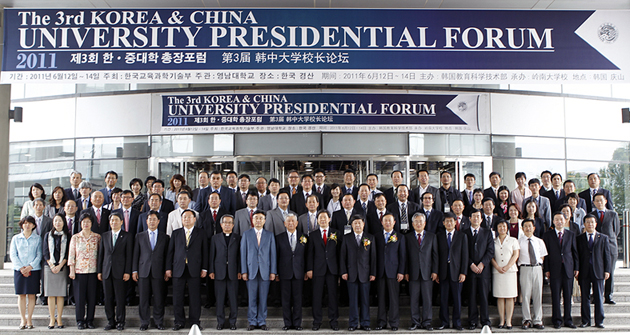
University presidents from the two countries pose for a picture at the 3rd Korea & China University Presidential Forum.
Yeungnam University (president Lee, Hyo-soo) played a leading role in winning the cooperation of universities in the three Northeast Asian countries in preparation of the start of the Asian Age, and once again demonstrated its leadership as a 'Glocal Initiative University (GIU)'.
With the attendance of university presidents of Korea and China at the YU Chunma Arts Center at 10 a.m. on the 13th, the '3rd Korea & China University Presidential Forum' was held. At this event with the aim of discussing the roles of universities and ways to come up with plans for cooperation in order to make the 21st century the Pacific Age and the Asian Age, Lee, Hyo-soo, president of YU stated in his keynote address, "The Asian Age won't come up just by waiting for it. The 21st century will be particularly focused on knowledge so the roles of universities will be very important." He also added with emphasis, "We should construct a closer mutual cooperation relationship among Korea, China and Japan, which make up to 74% of the GDP of Asia (as of 2010), hold regular forums for university presidents, and extend multilateral cooperation in joint research and education for the globalization of Eastern thinking, Asian culture and Asian values."
Actual plans for this suggested were ▲ extending the 'Korea & China University Presidential Forum' to the 'Korea-China-Japan University Presidential Forum' or Northeast Asia University Presidential Forum', and hosting them in link with the Korea-China-Japan Education Minister Meeting, ▲ announcing Asian issues and policies agendas annually at the university presidential forum, and establishing the 'Asia Future Conference: AFC, tentative name)' under the forum, and ▲ implementing the Asian 'ERASMUS Program (the multilateral educational cooperation program of the EU) such as promoting joint research, exchanging university credits, operating a joint education program, and offering joint degree programs.
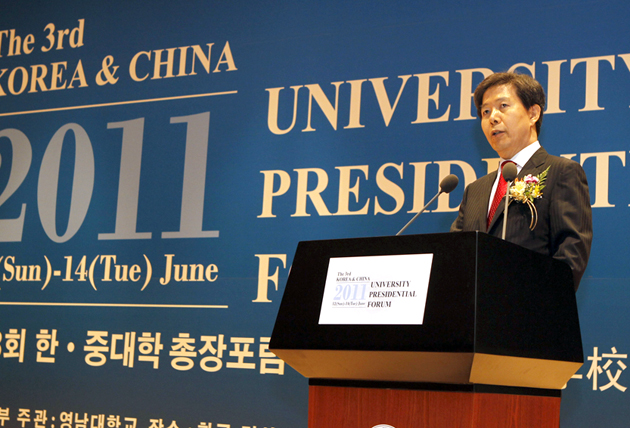
Zhao Ji (52) secretary of commerce of Jilin University, which is the managing university for China, stated in his congratulatory address on behalf of the universities in China, "There are approximately 120,000 international exchange students between Korea and China. and through this, both of us are gaining very much," and added, "Just as Europe is making preparations by signing the Bologna Process for the intelligence-based age that is becoming more global, I believe that we must strengthen our friendship and cooperation between not only universities of Korea and China, but among other Asian universities as well in order to open the Asian Age."
Yuan Guiren, Minister of Education of China, stated in his congratulatory address, "Cultural exchange focusing on education is an exchange of hearts of people, and therefore, it is much more significant," and added, "The Chinese Ministry of Education will do its best to further promote the Korea & China University Presidential Forum in order to foster the human resources of Asia, create an awareness for common interest of the two countries, and to further strengthen cooperation."
Under such objective, from Korea 21 university presidents including Yeungnam University POSTECH, Korea University and Yonsei University as well as the Ministry of Education, Science and Technology, and from China, 18 major universities receiving national funding in pursuance of the '985 Program' such as Fudan University, Beijing Normal University, Xi'an Jiaotong University, Tianjin University and Jilin University. The '985 Program' is a national project being commenced by the Chinese government since May 1998 and its official name is the 'World-Class University Construction Project'. Thus, it is expected that this forum will go beyond exchange and cooperation between universities of the two countries and become the start of the age of inter-national and inter-continental cooperation.
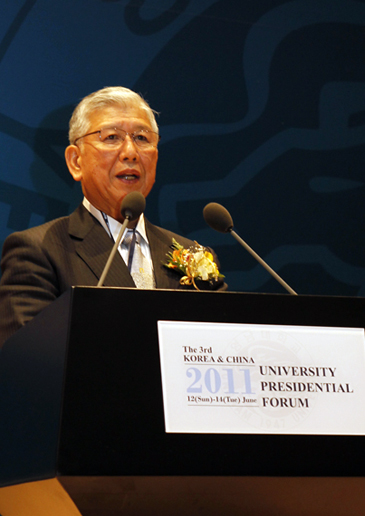
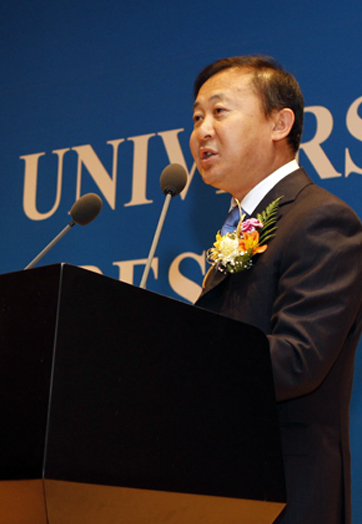
From left to right, Saeki, president of Hokkaido University of Japan, and Zhao Ji, secretary of commerce of Jilin University of China
At this forum, Saeki Hiroshi, president of Hokkaido University of Japan, also attended. At the opening session following the opening ceremony, Mr. Saeki took the podium as the speaker and stated, "Currently, we must not only foster expert human resources in specific fields, but also foster talents that can think about and contribute in pan-global and pan-human issues," while adding, "The universities of Korea, China and Japan should gather our strengths and strive to foster the human resources needed by not only Asia, but the world."
This forum, which discussed the roles of the universities and its presidents for the start of the Asian Age and which all searched for a new exchange and cooperation model focusing on undergraduate education and research exchange, was conducted all day long on the 13th. In particular, unlike the past, the participating university presidents freely expressed their opinions according to the sub-topics per session focusing on the practical tasks and the results of the discussions were promulgated as a 'joint declaration' by all the participating university presidents.
The joint declaration adopted unanimously by the participating universities were comprised of the following: ▲ pursue joint research for sustainable green innovation that can respond to climate change, air pollution, yellow dust, and environmental pollution, while concentrating efforts on joint research for the globalization of Oriental thoughts, Asian culture and Asian value. ▲ The participants also agreed to pursue the 'Green Innovation Movement' for the students of the universities of the two countries in order to foster young leaders who could deal with climate change. ▲ In addition, they agreed to jointly pursue 'cyber education' to foster global leaders of the 21st century, while sharing Asian values, and also pursue various exchange and cooperation programs including mutual exchange of students and professors.
This was the result of gaining the full agreement and support for the joint declaration(agenda) presented by YU to the Korea Ministry of Education, Science and Technology, Chinese Ministry of Education, and the participating universities from Korea and China. In addition to this, Lee, Hyo-soo, president of YU who directed the last session in confirming the contents of the joint declaration ▲ suggested to the Ministry of Education of each country to extend the forum into the Korea-China-Japan University President Forum, ▲ strengthen university president forum memberships and operation systems (organizing executive committees and international director working-level associations), ▲ and also led to the agreement of making a cyber space that makes sharing of information on research, education, and human resource pools possible, while foreshadowing the start of an era of cooperation among the three countries of Northeast Asia.
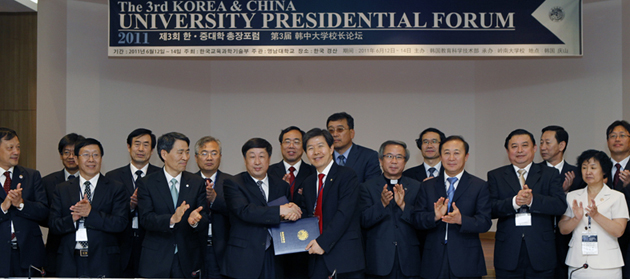
After announcing the joint declaration, Lee, Hyo-soo (right) is shaking hands with Kang Jing-woo, president of Southwestern Polytechnic University
Meanwhile, the 'Korea & China University Presidential Forum' is hosted by Korea Ministry of Education, Science and Technology and the Chinese Ministry of Education, and it is held at each country in turns annually with the goal to foster human resources and improve research competitiveness to represent Asia through cooperation among the universities of the two countries. The first forum was held at Korea University, and the second at Jilin University in Changchun, China from June 9 to 11 with the participation of 19 Korean universities and 22 Chinese universities. The 4th University President Forum in 2012 will be held at Sichuan University in China. They agreed that Yeungnam University, Korea University, Jilin University and Sichuan University would be organized into the executive committee and oversee preparations for the next forum.














